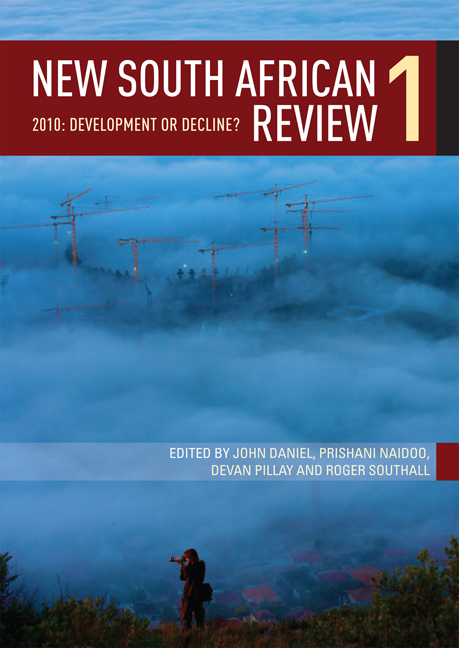Book contents
- Frontmatter
- Contents
- Preface
- Introduction South Africa 2010: From short-term success to long-term decline?
- PART 1 ECONOMY, ECOLOGY AND SUSTAINABILITY
- PART 2 STATE, POLITICS AND POLICY
- INTRODUCTION The politics and challenges of delivery
- CHAPTER 6 The African National Congress under Jacob Zuma
- CHAPTER 7 Indigent management: A strategic response to the struggles of the poor in post-apartheid South Africa
- CHAPTER 8 Fear, enervation and the systematisation of disorder: Challenges to reforming the Department of Home Affairs
- CHAPTER 9 The mobile nation: How migration continues to shape South Africa
- CHAPTER 10 South African female peacekeepers: An exploration of their experiences in the Democratic Republic of Congo
- PART 3 EDUCATION, HEALTH AND LAND
- PART 4 Doreen Atkinson
- Contributors
- Index
INTRODUCTION - The politics and challenges of delivery
from PART 2 - STATE, POLITICS AND POLICY
Published online by Cambridge University Press: 21 April 2018
- Frontmatter
- Contents
- Preface
- Introduction South Africa 2010: From short-term success to long-term decline?
- PART 1 ECONOMY, ECOLOGY AND SUSTAINABILITY
- PART 2 STATE, POLITICS AND POLICY
- INTRODUCTION The politics and challenges of delivery
- CHAPTER 6 The African National Congress under Jacob Zuma
- CHAPTER 7 Indigent management: A strategic response to the struggles of the poor in post-apartheid South Africa
- CHAPTER 8 Fear, enervation and the systematisation of disorder: Challenges to reforming the Department of Home Affairs
- CHAPTER 9 The mobile nation: How migration continues to shape South Africa
- CHAPTER 10 South African female peacekeepers: An exploration of their experiences in the Democratic Republic of Congo
- PART 3 EDUCATION, HEALTH AND LAND
- PART 4 Doreen Atkinson
- Contributors
- Index
Summary
These [apartheid] laws may have disappeared from the statute books, but their effects are still felt across the country. Freedom imposes on us a responsibility to work together in the process of changing such conditions. And we must do this fast, because in four year's time we will have been free for twenty years. We will not have much sympathy for any reasons advanced to explain the failure to make a difference in the lives of our people.
(President Jacob Zuma, Freedom Day address, 27 April 2010)This section begins with a sweeping overview of the radically changed South African political landscape post-Polokwane. It is followed by three chapters looking at different aspects of that landscape that either bedevil or deeply affect the state's priority to deliver a better life to all South Africans. Closing the section is the only chapter in the entire volume with a foreign policy dimension, a void which we intend to fill in the next edition of the Review. This void does, however, speak to the much lower foreign policy profile of the Zuma administration in contrast to the hectic jet-setting years of the two Mbeki governments. That was a time when the actual physical presence of the president in the country sometimes evoked comment, and it would not be far-fetched to suggest that the priority Thabo Mbeki accorded to South Africa's diplomatic role in Africa and the wider world cost him dear at home. Only someone with his eye ‘off the ball’ could have failed to notice how, by his second term, he had alienated his once adoring party constituency and even imagined that they would amend the party's rules and grant him a third term as its leader.
By stark contrast, to Jacob Zuma and his government the domestic terrain comes first. It is the political coal face, the frontline. He and his political team understand all too well that its political fate will be determined not at the African Union or in the UN Security Council but in the dusty and pot-holed township streets occupied by an increasingly impatient lumpen army of the poor. To distort the slogan once employed by former US President Bill Clinton, ‘it's delivery, stupid’; hence the quote at the head of this chapter.
- Type
- Chapter
- Information
- New South African Review2010: Development or Decline?, pp. 158 - 163Publisher: Wits University PressPrint publication year: 2010

